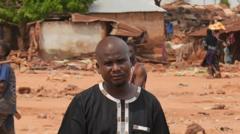A popular Nigerian television comedy-drama, "Gidan Badamasi," is provoking discussions on family size and societal implications of having many children. The series highlights the challenges of a rapidly growing youth population in Nigeria and reflects on the potential opportunities and pressures facing society today.
Watchful Eyes: How a Popular Nigerian TV Series is Igniting Fertility Debates

Watchful Eyes: How a Popular Nigerian TV Series is Igniting Fertility Debates
In the heart of Kano, Nigeria, a hit comedy-drama show is stirring conversations about family size, child-rearing, and societal expectations amidst Africa’s youth boom.
The Sani family eagerly gathers around their worn-out television in the bustling city of Kano, Nigeria, creating a cozy pile of excitement and anticipation as they prepare to watch “Gidan Badamasi.” This beloved comedy-drama, which humorously portrays a wealthy recurring character with numerous wives and children, is not just a source of entertainment; it has sparked significant conversations regarding family size and its implications in the socio-cultural context of Nigeria.
In a society where having multiple children is still celebrated, the show's narrative resonates deeply among viewers, particularly in northern Nigeria. The kids in the neighborhood, much like the young ones from the Sani family, often engage in after-school Quranic lessons, showcasing traditional values while navigating contemporary issues highlighted in the series.
Nigeria is witnessing one of the fastest population growth rates in the world. Currently, Nigerian women average over five children each, a stark contrast to the lower averages seen in wealthier nations. With advancements in healthcare reducing child mortality rates, concerns about overpopulation and the ability to provide for large families are increasingly coming to the forefront. Alongside these worries, the country also faces a pressing need to invest in education and job opportunities for its burgeoning youth demographic.
The popularity of "Gidan Badamasi" serves as a cultural touchstone, reflecting the real-life paradox of joy and pressure surrounding family size in contemporary Nigeria. As discussions about responsible parenting and the consequences of large families expand, they cast light on both the opportunities and challenges posed by Africa's expanding youth population.
In a society where having multiple children is still celebrated, the show's narrative resonates deeply among viewers, particularly in northern Nigeria. The kids in the neighborhood, much like the young ones from the Sani family, often engage in after-school Quranic lessons, showcasing traditional values while navigating contemporary issues highlighted in the series.
Nigeria is witnessing one of the fastest population growth rates in the world. Currently, Nigerian women average over five children each, a stark contrast to the lower averages seen in wealthier nations. With advancements in healthcare reducing child mortality rates, concerns about overpopulation and the ability to provide for large families are increasingly coming to the forefront. Alongside these worries, the country also faces a pressing need to invest in education and job opportunities for its burgeoning youth demographic.
The popularity of "Gidan Badamasi" serves as a cultural touchstone, reflecting the real-life paradox of joy and pressure surrounding family size in contemporary Nigeria. As discussions about responsible parenting and the consequences of large families expand, they cast light on both the opportunities and challenges posed by Africa's expanding youth population.



















